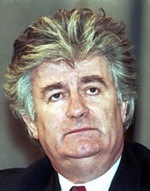Summary | Excerpt | Reading Guide | Reviews | Beyond the Book | Read-Alikes | Genres & Themes | Author Bio

A Rachel Getty and Esa Khattak Novel
by Ausma Zehanat KhanThis article relates to The Unquiet Dead
 On June 25 1991, Slovenia and Croatia declared independence from Yugoslavia, which, since World War II, had operated as a federal republic comprised of the territories – Slovenia, Croatia, Bosnia and Herzegovina, Serbia, Montenegro and Macedonia.
On June 25 1991, Slovenia and Croatia declared independence from Yugoslavia, which, since World War II, had operated as a federal republic comprised of the territories – Slovenia, Croatia, Bosnia and Herzegovina, Serbia, Montenegro and Macedonia.
The departure of Croatia, a republic with a large Serbian population, was of particular concern to Slobodan Milosovic, Serbia's party leader and president, who also served as president of the Federal Republic of of Yugoslavia from 1997 to 2000. Armed conflict followed, initially focused in Slovenia and Croatia. But as the desire for independence spread to Bosnia and Herzegovina, a republic with a diverse ethnic population including a large Muslim population and a Serbian (and pro-Yugoslavian) contingent led by Radovan Karadzic, any semblance of stability dissolved. At the time of the war, which lasted from 1992 to 1995, Bosnia's population was greatly intermixed with about 44% Muslim Bosniaks, 31% Orthodox Serbs and 17% Catholic Croats. Bosnian Serb forces, backed by the Serb-dominated Yugoslav army, targeted both Bosniak (Bosnian Muslim) and Croatian civilians, resulting in the deaths of some 100,000 people (80 percent Bosniak) by 1995.
Although the conflict in Bosnia began with the siege of Sarajevo in 1992 and did not end until the Srebrenica massacre of 1995, already by 1993, the United Nations had established the International Criminal Tribunal for Yugoslavia in response to "reports depicting horrendous crimes, in which thousands of civilians were being killed and wounded, tortured and sexually abused in detention camps and hundreds of thousands expelled from their homes."
Twenty years on, the Tribunal is still fully operational. Over 160 individuals have been indicted and only a handful of cases remains to be completed. The Tribunal has indicted individuals from every ethnic background in the former Yugoslavia, although the majority have been Serbian. These include heads of state, prime ministers, army chiefs-of-staff, interior ministers and many other high- and mid-level political, military and police leaders from various parties to the Yugoslav conflicts.
Slobodan Milosevic was indicted in 1999 and charged with genocide, murder and other hate crimes but died in his cell of a heart attack in 2006 before his trial was completed.
 Radovan Karadzic is one of the four men whose trial is still ongoing. Karadzic has been charged with acts of genocide, including the elimination of Bosnian Muslims in Srebrenica and numerous other municipalities. He is also charged with being behind the Siege of Sarajevo and a range of crimes against humanity including acts of persecution, torture and the murder of detainees. In 1995 Radovan Karadzic became a fugitive from international justice. Despite large-scale efforts to find him, Karadzic was able to spend over ten years as a free man operating as a new-age healer named Dragan Dabic wearing his hair long and sporting a lengthy beard.
Radovan Karadzic is one of the four men whose trial is still ongoing. Karadzic has been charged with acts of genocide, including the elimination of Bosnian Muslims in Srebrenica and numerous other municipalities. He is also charged with being behind the Siege of Sarajevo and a range of crimes against humanity including acts of persecution, torture and the murder of detainees. In 1995 Radovan Karadzic became a fugitive from international justice. Despite large-scale efforts to find him, Karadzic was able to spend over ten years as a free man operating as a new-age healer named Dragan Dabic wearing his hair long and sporting a lengthy beard.
Although Karadzic, whose trial concluded in October 2014 but whose verdict is still awaited, is not cited by Ausma Zehanat Khan as direct inspiration for any of the characters in The Unquiet Dead, the stories of others who have been tried by the ITCY did inspire some of the fictional characters in her book. Karadzic's success in evading capture for so many years gives veracity to the story that unfolds in The Unquiet Dead.
1993 map of the former Yugoslavia from U.S. Department of State
Picture of Radovan Karadzic by Mikhail Evstafiev
Filed under People, Eras & Events
![]() This "beyond the book article" relates to The Unquiet Dead. It originally ran in February 2015 and has been updated for the
December 2015 paperback edition.
Go to magazine.
This "beyond the book article" relates to The Unquiet Dead. It originally ran in February 2015 and has been updated for the
December 2015 paperback edition.
Go to magazine.
Your guide toexceptional books
BookBrowse seeks out and recommends the best in contemporary fiction and nonfiction—books that not only engage and entertain but also deepen our understanding of ourselves and the world around us.